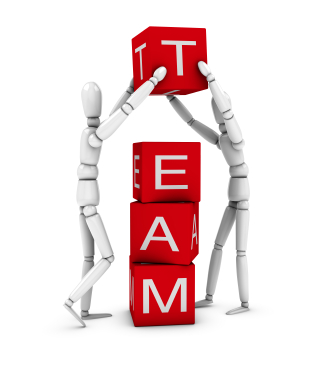Making Change Happen: Smart Team Building
 Leaders are told that bringing people together as a “team” is the ultimate means to achieve peak performance. So we feverishly plan team events, team brainstorming, team retreats, team training, team potlucks, team sweatshirts, and every other team-building thing we can think of to try to turn our groups into teams.
Leaders are told that bringing people together as a “team” is the ultimate means to achieve peak performance. So we feverishly plan team events, team brainstorming, team retreats, team training, team potlucks, team sweatshirts, and every other team-building thing we can think of to try to turn our groups into teams.
So why does it fail much of the time? And what can we do to make it work? To get some new perspective, I turned to the web for answers — and I’m happy to share what I learned, because it gave me a path forward as a project manager and member of a group. Much of it hinges on whether you are currently a work group or a team, and if you should become something else.
What’s the Definition of a Team?
This definition of a team comes from a heavily-quoted book on team-building, The Wisdom of Teams (Katzenbach and Smith, 1993): “A team is a small number of people with complementary skills who are committed to a common purpose, a set of performance goals, and a common approach for which they hold themselves mutually accountable.”
What does that really mean? Consultant Sharon Feltham (http://www.excellerate.co.nz/ttgroupsvsteams.html) breaks it down this way:
6 Success Factors that Define a Team
- Small number of people: There are fewer than 12 members (sometimes much fewer)
- Complementary skills: The team identifies and uses the different perspectives, knowledge, skills and strengths of each member.
- Performance goals: The team has clearly defined objectives for which members are individually and collectively accountable.
- Common approach: There is a sense of shared purpose, with a clear understanding of the team’s mission and vision.
- Mutually accountable: The results come from a collective effort rather than just the sum of individual efforts. People are accountable not only for their own efforts but those of others.
- Leadership: Instead of having a strong solo leader, the team rotates leadership.
What’s the Definition of a Work Group?
Consultant Marie J. Kane [PDF article] notes that in a work group, there is “no significant incremental performance need or opportunity that would require it to become a team.” So the members may come together to share ideas or help each other make decisions in their own areas of responsibility, but mutual accountability is lacking — there is no common objective.
Deborah Mackin, an author of several team-building books, points to a fundamental difference: “a small group of people with complementary skills and abilities who are committed to a leader’s goal and approach and are willing to be held accountable to the leader.” In other words, the group accepts the goals they are given, the members report to the leader, and individual performance is generally evaluated by that leader.
Should a Group Always Try to Become a Team?
Look around your organization. There are probably few genuine teams, and you can spot them immediately because their work is stellar. Everyone talks about them and admires their efforts. These teams perform well for two key reasons: the six success factors noted above are all present; and the members have put a tremendous amount of time, effort, and emotional capital into forming a high-performance team.
4 Questions to Determine if You Need a Team
- Is there a genuine need for change?
- Will there be a return on investment?
- Is there support from senior management?
- Is there enough potential for better performance from the individuals in the group?
What’s The Path Forward?
I said at the beginning of this post that I saw the way forward, so here it is: my group is genuinely a work group and should remain so. We are large. We don’t all do the same work — in fact some of us have never worked together on a project or service. But that’s not to say we’ve given up on the idea of teams.
Instead, we’ve started focusing on building small high-performance teams within our group –- even two people can constitute a high performance team. Being on a high performance team makes me feel like I’m really making a difference, and it gives me a chance to stretch my wings and improve my skills. In time we hope to see more small teams working together to create change.
And of course Lena and I hope our readers see us as a team — we have worked hard to fulfill all the criteria of a genuine team and it’s made our work together very satisfying.
What’s happening in your area? Should you be a team or a group? Maybe it’s time to make a conscious choice!
Coming together is a beginning.
Keeping together is progress.
Working together is success.
— Henry Ford
Now It’s Your Turn
1. Learn more about the differences between teams and work groups by reading the articles linked above.
2. Talk to your work group about whether change is needed and whether they can make a commitment to changing the way they work.
3. Before you move forward, be sure to read The Wisdom of Teams (Jon R. Katzenbach and Douglas K. Smith, 1993). It’s a wealth of information, advice, and practical steps that will help your team to achieve its goals.
